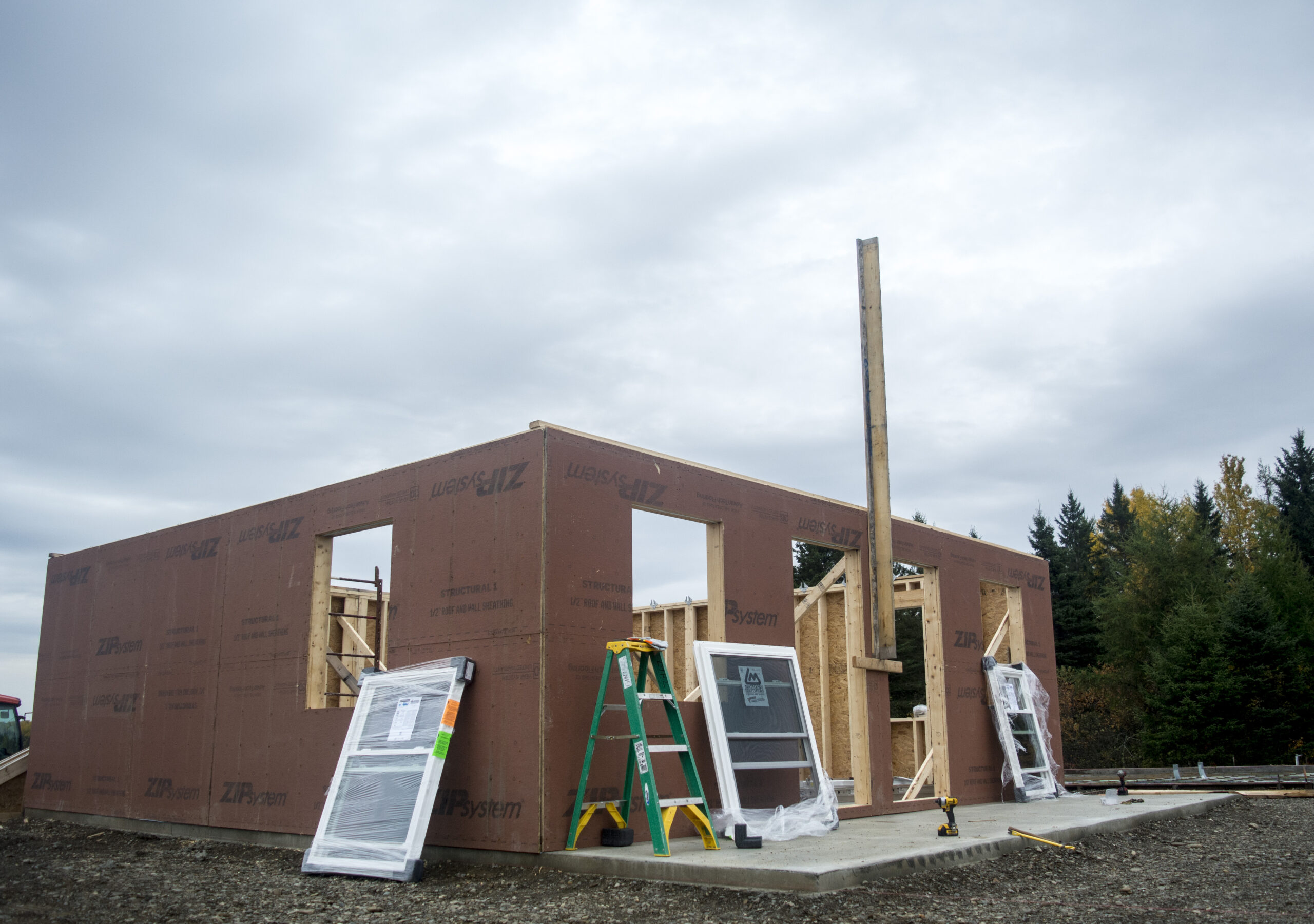
CARIBOU, Maine — In the past two years, United Veterans of Maine President John DeVeau’s plan to create a self-sustaining homeless veteran shelter has transitioned from idea to reality. The organization obtained land on the Washburn road where Phil’s Florist stood before burning down, and has relied on local fund-raising efforts to find the needed money to make the project happen.
The facility, which will be called the Dahlgren-Skidgel Farm of Hope, after two local Congressional Medal of Honor recipients, will not only provide veterans with a place to live, but also a job growing crops in the former floral shop’s greenhouses, which DeVeau said will provide homeless vets with a source of income and a sense of purpose.
The administration building is currently complete, along with cement foundations and plumbing for four duplexes to house a total of eight veterans. On Saturday, Oct. 7, volunteers worked on framing the first duplex and preparing crops in the greenhouses.
Among the volunteers were employees of the Presque Isle Lowe’s home improvement store, who participated as part of the chain’s annual “Heroes” project, in which they assist nearby communities with various needs.
Shawn Dumais, manager of the Presque Isle Lowe’s said he and the store’s team have been excited to tackle the project since early this summer.
“We knew it was something we wanted to do right away,” said Dumais. “It was eye-opening to see how many people this project was going to help.”
Dumais commented on how nearly every aspect of the project was funded with community donations or completed by volunteers, adding that he and his team were there to “support the community” and be a part of the project.
With slabs and piping laid down by Loring Job Corps masonry students, volunteers Saturday focused on putting together the prefab duplexes donated by Aroostook Trusses in Presque Isle.
“It’s just a matter of laying it out,” Dumais said, “It’s like putting together a big kit.”
- United Veterans of Maine Volunteers, from left, Blue LaBeet-Billois, Project Manager Sam Clark, and John DeVeau Jr. work on planting carrots in a greenhouse for veterans in need on Saturday, Oct. 7. (Christopher Bouchard)
Meanwhile, some volunteers worked to plant vegetables in the greenhouses. DeVeau’s son, also named John, worked with UVM members Blue LaBeet-LaBillois and Project Manager Sam Clark early Saturday morning in the greenhouse.
John Junior, 14, said he was there to help the veterans get access to more food “because they weren’t able to have it” otherwise. He added that Oct. 7 was his first time in the greenhouse, and that he’s ready to take on any tasks he’s given.
LaBeet-Billois said that she and the crew were getting ready to plant carrot seeds, and that Clark was constructing a table for the task.
“At some point, we’d like for people in the veterans’ home to take a field trip down here to see the gardens,” LaBeet-Billois said, adding that the organization is planning to “do another greenhouse and make it wheelchair-accessible with lowered tables so disabled veterans can come in and help out.”
LaBeet-Billois said that UVM would greatly appreciate additional volunteer help from the community, even from someone willing to volunteer just an hour or two.
Community groups and businesses have been contributing since the project was in its conceptual stage, with Caribou’s Class of 1944 recently donating $144.46 to the project.
Class member Florence Gallagher came up with the idea to donate to UVM, and said the decision was “unanimous” amongst her classmates.
- Employees with the Lowe’s Presque Isle store participate Saturday in the chain’s annual “Heroes” project by helping United Veterans of Maine build the first of four duplexes in Caribou to house homeless veterans. (Christopher Bouchard)
“Everyone agreed that it was a great idea,” Gallagher said. “I know it’s only a little drop in the bucket, but every drop helps. It’s truly not much, as far as money is concerned, but we don’t need it any more.”
Gallagher said that, while she was in school, the country experienced a wave of patriotism that she has not seen since.
“I truly think it’s hard for young people today to understand what a wave of patriotism encompassed the country in that time,” Gallagher said. “We were at war and it was so different from the later wars, especially the Vietnam war, but people were truly patriotic and went in so many different directions to support the war effort. Women went to factories to build.”
Gallagher added that the song “Rosie the Riveter,” written in the early ‘40s depicting a woman working on an assembly line to help with the war effort, inspired many women to join the workforce and that other classmates “went to Washington, D.C., to become secretaries in the war effort.”
DeVeau said the amount of private donations and community support for the project has been a pleasant surprise, and that he and volunteers are going to be working “non-stop until we get it done.”
A similar volunteer event will be held on Saturday, Oct. 14, during which area residents and members of organizations are urged to volunteer their time to help construct the duplexes.
UVM has raised roughly $82,000 so far, including more than $45,000 during a WAGM-TV telethon in March. The group continues to raise funds and needs an additional $60,000 for heating and air conditioning units, and to help pay for electricty and water for the duplexes and greenhouses.
Deveau added that, while this project is taking place, United Veterans of Maine are simultaneously helping out a veteran they met with on Friday.
“We are still attending to veterans in crisis while we work on this project,” he said.








